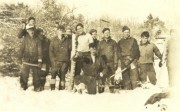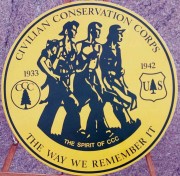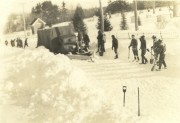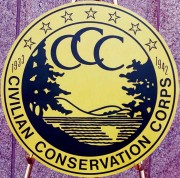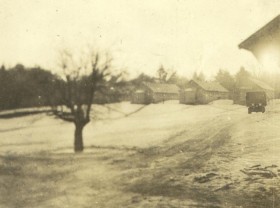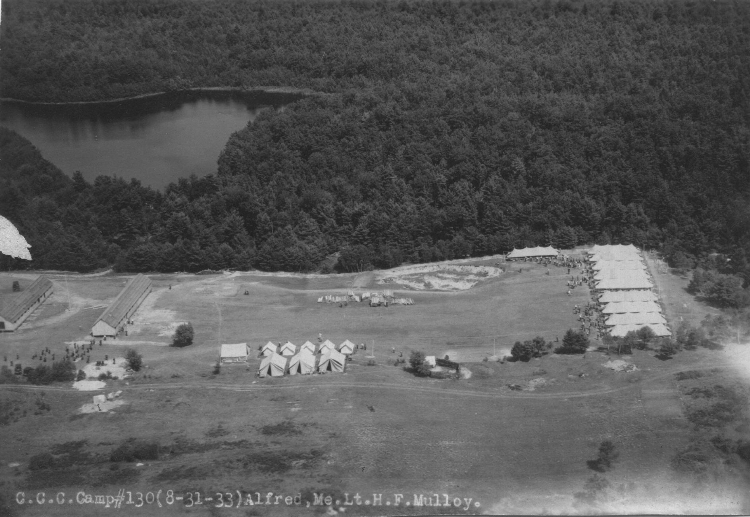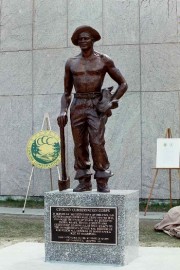The CCC was established by Congress on April 5, 1933 as recommended by President Franklin B. Roosevelt. On April 27th Maine received its first quota for 1,800 men, mostly youths between 18 and 24.
The quota was divided proportionately among the counties based on population, with Cumberland getting 256 and heavily forested Piscataquis receiving only 44 slots. The U.S. War Department administered the program and Fort Williams, at Cape Elizabeth, in Portland Harbor became the headquarters and training center for both Maine and New Hampshire. A recruiting office in Bangor served Aroostook, Hancock, Penobscot and Piscataquis counties.
After physical exams and conditioning, recruits were assigned companies in project camps for a minimum of six months and a maximum of two years. The base pay was $30 per month of which $25 went to the enrollee’s family. Leaders selected from the recruits earned somewhat more.
By July, 1933, 1,600 enrollees were in fourteen camps from southern Maine to the White Mountain National Forest, to Acadia National Park.
While the original law required young men to be unemployed to be eligible for the CCC, a revision in 1935 expanded enrollment to men on public assistance, either directly or through their families. It also increased the upper age bracket to 29. As a result by July of 1935, Maine’s enrollment had nearly doubled to 2,763 and peaked in November at 3,425 in nineteen camps.
After 1937, the Corp’s emphasis was less on emergency relief and more on training young men eager to work. Later, as the war in Europe loomed large, training having military value became more apparent. By early 1942 only two companies remained and they soon closed.
Overall, 16,686 Maine enrollees, 1,612 supervisors and technical staff, and 1,136 out-of-state enrollees served in 28 camps in the Pine Tree State. Most were under twenty years old, but their families received $4 million during the period.
Most work involved road construction and maintenance in the unorganized townships to support fire suppression efforts. Other significant projects included those fighting forest insect pests such as the gypsy moth, the brown-tail moth, and the spruce saw fly and fighting white pine blister rust.
A memorial to Maine CCC members was dedicated in Augusta on the Capitol grounds in April, 2001.
Civilian Conservation Corps Camps
by Supervisory Agency, Location and Camp Name
| Supervisor/ Location | Camp Name | |
| National Park Service | ||
| Southwest Harbor | Great Pond | |
| Bar Harbor | Eagle Lake | |
| Ellsworth | Governor Brann | |
| Millinocket | Baxter Park, Foster Field | |
| Millinocket | Baxter Park, Avalanche Brook | |
| Camden | Camden Hills | |
| U.S. Forest Service | ||
| Gilead, Stow | Wild River, Cold River | |
| U.S. Bureau of Biological Survey | ||
| Ayer Junction | Moosehorn | |
| Maine Forest Service | ||
| Flagstaff | Flagstaff | |
| Greenville | Moosehead | |
| Millinocket | Millinocket | |
| Patten | Patten | |
| Princeton | Far East | |
| Rangeley | Rangeley | |
| Seboomook | Seboomook | |
| Beddington | Beddington | |
| Grant Farm | Kokadjo | |
| Wesley | Kerwin Brook | |
| Alfred | Alfred | |
| Jefferson | Jefferson | |
| Lewiston | Lewiston | |
| Bridgton | Bridgton | |
| Stow | Cold River | |
| Hurricane emergency | ||
Additional resources
Caldwell, John Carroll. A Curriculum Proposal for a Civilian Conservation Corps Camp in rural Maine: a proposal based on 211 individual histories and daily contact during camp residence with 124 enrollees during 1936-1937. 1937. (Thesis (M.A.) in Education–University of Maine, 1937) [Orono. University of Maine. Raymond H. Fogler Library. Special Collections.]
In the Public Interest [moving image recording]: The Civilian Conservation Corps in Maine. Augusta, Me. University of Maine at Augusta Press, 1988. [University of Maine at Presque Isle. Special Collections]
Maine. Committee to Establish a Memorial Dedicated to the Civilian Conservation Corps. Final Report of the Committee to Establish a Memorial Dedicated to the Civilian Conservation Corps. Augusta, Me. Office of Policy and Legal Analysis. 2000.
McGuire, Harvey Paul. The Civilian Conservation Corps in Maine: 1933-1940.
Schlenker, Jon A. In the Public Interest: the Civilian Conservation Corps in Maine. Augusta, Me. University of Maine at Augusta Press. c1988.


